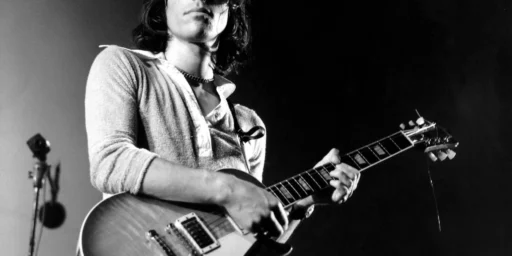This Country Was Founded by Religious Nuts With Guns
Some of the discussion I’m seeing on Twitter about the alleged perpetrators of the Boston Marathon terrorist attack brought to mind this old P.J. O’Rourke bit from 20-odd years ago:
The Clinton administration launched an attack on people in Texas because those people were religious nuts with guns. Hell, this country was founded by religious nuts with guns. Who does Bill Clinton think stepped ashore on Plymouth Rock?
For those not old enough to remember, this was in response to the assault on the Branch Davidian compound–which, coincidentally, took place twenty years ago yesterday. Conservatives were, I think, correctly outraged at the heavy-handed tactics employed. It’s interesting, indeed, how far we’ve come in the two decades since.






I was driving along yesterday and saw the typical beat to **** car with a “live free or die” sticker.
It gave me pause, and made me think. Did you ever notice that Canada avoided bloody revolution, and turned out OK?
I have no idea what I would have thought, had I been raised in the milieu of 18th century New England … but I’m not really sure that violence was justified. “Give me liberty or give me death” is great rhetoric, but more suited to a place with death squads or gulags.
@john personna: I hope your comment is satire.
@Dean:
I’m concerned with the difference between “ideas worth killing for” and “ideas worth dying for.”
I would not murder you, say, to change my tax rate.
Maybe someone can fill me in, and remind me that British governors in New England did kill and torture with the abandon of a Saddam or a Qaddafi. But if not, what justified bloody revolution, with emphasis on the bloody?
That would be funny, if it were true. On the whole, the Founders were Deists, which was as close to atheist as you could get in polite society those days.
You forgot slave owning, religious nuts with guns.
How far we’ve come, indeed.
Cheers.
All this angst over “A well regulated militia being necessary …” ?
By the way, when did “well regulated” get dropped from the Second Amendment?
@john personna:
You really need to watch The Patriot!
😉
@john personna:
So you are saying all those struggles in the middle of the 20th century to throw off British and other colonialism were uncalled for? That Kenya, India, etc. could be just as free if they’d just bided their time?
But you see, the United States was new in its time. It was a government of the People. It wasn’t some privileges granted by a sovereign. A sovereign who though not ruling by edict, is still on the throne.
Don’t forget bayonets and swords!
Those 18th century firearms were only good for one shot in a classroom or movie theater.
@al-Ameda:
This is an interesting perspective on that:
http://truth-out.org/news/item/13890-the-second-amendment-was-ratified-to-preserve-slavery
Makes for a good quick read.
@al-Ameda:
I love progressive focus on “A well regulated militia being necessary …”
but dismiss the “RIGHT OF THE PEOPLE” part/
@Argon:
They did not have TV, Radio or the Internet back then.
So the Government can regulate any speech on them?
@al-Ameda:
At the time “well-regulated” didn’t have anything to do with government regulations in the moderns sense. It meant something closer to “orderly”. At the time, one of the main training books for the Continental Army was called “The Manual of Regulations”. It wasn’t a law book, it was a drill manual, describing how officers were supposed to make their soldier march and practice firing so that they would be prepared for combat. The “A well regulated militia being necessary to the security of a free state” should be read as something along the lines of “because we need these chuckleheads to know what the hell they’re doing if we ever have to call them up”.
@Paul L.: Hi Paul. My comment was not about regulation. However, since you brought it up… With regard to arms, I’m pretty confident our government does retain some regulatory ability and that this can and will adapt to changing technology. There is a difference between *any* and *some*. There are some types of weapons an individual cannot own. Similarly there are some forms of speech that are not protected.
Seriously? Heavy handed? It was a siege lasting 51 freaking days after law enforcement officials were fired on while serving a legally obtained warrant.
Hell if it had been a meth lab it would all have been over within an hour. This is yet another example of conservative’s tenuous relationship with reality.
@Davebo: The whole siege was unnecessary. Koresh frequently left the compound. He could easily have been arrested then rather than creating this absurd stand-off.
@Argon:
Interestingly enough, no less a legal mind than Justice Antonin Scalia agrees with you. (see Heller)
@Stormy Dragon:
Indeed. Of course, the arms they were talking about had nothing to do “arms” in the modern sense, either. The times they are a changing.
Of course those religious nuts with guns also burned witches.
The wrongs done by religious nuts with guns (or without guns) far outweighs the good.
@C. Clavin: Oh, I’m not defending the excesses committed in the name of religion. I’m pointing out that conservatives rallied around Koresh, an extremist Christian, 20 years ago but want to exclude extremist Muslims from the fundamental protections of our Constitution now.
@JKB:
I asked for examples of British cruelty in 18th century America and Canada. When you have to move two continents and two hundred years away to find your example …
European oppression of Africans is a whole other thing, and one in which the US is not blameless.
Being religious and being obsessed with gun ownership at the same time don’t seem to go together as far as I’m concerned. God was all about love and turning the other cheek etc. I doubt he’d approve of everyone being armed and dangerous and solving arguments with a gun which is exactly what happens today. The 2nd amendment is used and abused because it only mentions a well-regulated militia. Nothing about an individual right for a person to own a gun!! The NRA and others have taken it totally out of context and ran with it for years! Yet, they profess to KNOW all about the Constitution and what it stands for! That in itself is laughable.
@john personna:
You missed the point about our way being new. A progression in governance.
Up till then a supposed elite ruled based on some tart lounging in a pond giving out swords.
@JKB:
That was another flier. While we did move the bar in governance, our philosophy of government had deep British roots, and undeed they (and Canada) were on a path to greater democracy.
A really strong counterfactual would have been a Canada oppressed for years by a cruel minarch, but that did not happen. Rigjt?
(Do you think 18th century England still had unchecked, Aurthurian, monarchy?)
@john personna: England didn’t have anything like popular sovereignty until the Reform Act of 1867.
@James Joyner:
I did double check the timeline, but for this discussion I think we should focus on how bad life was under the Crown in Britain, or the colonies.
We are certainly give a simple morality tale in grade school, that the American Revolution was justified but the Whiskey Rebellion was not. I am just pondering how much of that is “winners writing history.”
(1867 was not the start of the timeline, by any means.)
Why didn’t we run north in 1780 and “save Canada from oppression?”
Funny that we tend to look back and think they and we were both fine, on our different paths.
@JKB:
So you are saying all those struggles in the middle of the 20th century to throw off British and other colonialism were uncalled for? That Kenya, India, etc. could be just as free if they’d just bided their time?
@john personna:
IIRC, there actually was an attempt to go to Canada and start an independence movement there (as well as to start another front in the war). I forget the precise details.
@john personna:
Ask the Irish or the Indians. 🙂
In fact, there were several rebellions against British rule in Canada, but they were unsuccessful. And the point went beyond oppression, but to the point that when the European countries faced expensive wars they would increases tariffs and taxes in their colonies. One of the first rebellions on Brazil would be motivated by 20% tariff over gold.
This country was founded by mostly religiously moderate folk who reluctantly took up guns. THAT’S the truth, not Mr. O’Rourke’s facile , sophistical formulation.
Ethan Allen and a small army attacked Montreal in Sept. Of 1775. He was defeated and captured. He considered himself to be an officer in the continental army. The English considered him a rebel and he was held under very brutalconditions; taken to England and returned to new York and held as a prisioner.Ethan Allen by w s Randall has more details.
Waco was caused by both a mistake by the ATF and David Koresh being batshit crazy.
Can’t imagine any Frenchman, not even Napolean, could have considered the Louisiana sell-off if it was to be to those (ptui!!) Limey’s. The British might have continued to forbid their subjects from moving further west and thereby causing another war between them and with France. One of those counter-factual history problems Newt likes to tackle…Nuff’ said….
Plymouth Rock? The Mayflower guys were communists.
” Conservatives were, I think, correctly outraged at the heavy-handed tactics employed. It’s interesting, indeed, how far we’ve come in the two decades since.”
You don’t think that “conservatives” were in anyway “outraged” by their animus to Clinton? Hmmmm…. Okay, just keep repeating to yourself “mmmm, kool-ade guuuuuuud!”
@john personna:
You are pondering a great example of what I have always felt to be the most important question in public education – who gets to decide what’s in the text books.
Texas carries this to the absurd, but your Whiskey Rebellion example is just as valid. I was in college before I learned that black people did anything significant in the United States – or even that there was another perspective on history to be considered – and I attended an upper-middle class, well funded US school. That is a shameful indictment of our US public education system.